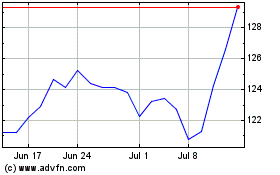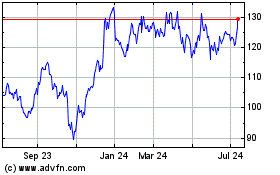Blackstone Deal Values BioMed at $14.6 Billion as Pandemic Raises the Stakes
October 15 2020 - 5:58PM
Dow Jones News
By Craig Karmin
Blackstone Group Inc. is extending its big bet on biotechnology
and other life-science buildings, a hot field in the real-estate
world that is heating up even more as scientists pursue a vaccine
for Covid-19.
The New York investment firm said it looked at selling or taking
public BioMed Realty Trust, the second-largest U.S. owner of
life-science buildings with 93 properties, which Blackstone
acquired in 2016. The Blackstone fund that owns the company
eventually needs to exit all holdings and return money to
investors.
But fund investors said they wanted to continue owning BioMed
rather than cashing out, the investment firm said. So the fund has
agreed to sell BioMed to another Blackstone fund that can hold it
indefinitely and enable investors to stay in, according to firm
executives.
The sale price of $14.6 billion amounts to about a $6.5 billion
gain in value from the 2016 purchase, Blackstone said. To ensure
this represented a fair price for buyer and seller, Blackstone
added, it consulted outside advisers to determine the value. Morgan
Stanley will also solicit bids on BioMed to determine whether a
higher offer exists.
That $6.5 billion profit is the third highest achieved by any
Blackstone fund, behind only dispositions of Hilton Hotels
Worldwide Inc. and Equity Office Properties Trust.
Blackstone and its investors' resolve to hold on to the company
-- the first time Blackstone real-estate funds have executed this
kind of transaction -- is the latest sign of intensifying demand
for the fast-growing real estate niche.
The business of providing lab space has taken off in recent
years as new drugs, treatments and devices are increasingly
developed at startup firms, rather than in-house at large
pharmaceutical companies.
"Interest in the life-sciences sector from developers, investors
and financial backers already was strong in recent years, and the
unfortunate arrival of Covid-19 brought even more attention and
capital into the sector," said Steve Purpura, a vice chairman in
real-estate firm CBRE Group Inc.'s life-sciences group.
The average vacancy rate for the 13 largest life-sciences
markets was 6.1% at the end of the second quarter, compared with an
office-vacancy rate nearly double that in those markets, CBRE said.
With the industry moving some overseas operational facilities back
to the U.S., that could generate even more demand, the firm
added.
Divisions of JPMorgan Chase & Co. and Related Cos. have also
been owners of life-science properties, while venture-capital money
continues to pour into life-science startups -- $17.8 billion for
the year ended in the second quarter, a record for a four-quarter
period, according to data in a CBRE report.
The BioMed transaction also reflects how Blackstone continues to
shift its $329 billion global real-estate portfolio away from many
traditional bricks-and-mortar investments in favor of properties
serving new businesses and industries.
"We look at what is happening in the world," said Kathleen
McCarthy, global co-head of Blackstone's real estate group, "and
ask if there is a way to put what we see into a real estate
context."
For Blackstone, that has meant ramping up purchases of
industrial warehouses that service e-commerce and acquiring stakes
in production facilities where companies like Netflix Inc. and Walt
Disney Co. are creating content.
Life-science buildings are also part of this emerging vision.
Blackstone brought in a new leadership team for BioMed shortly
after the 2016 acquisition. It sold and bought properties so that
the portfolio would be concentrated in the top markets for life
science, including the Boston area, San Francisco and San Diego.
Blackstone also boosted the occupancy levels at the properties,
which was 91% when it acquired BioMed and now stands at 97%, Ms.
McCarthy said.
The life-science sector isn't without risk. Building owners face
the high cost of building and maintaining lab space that often
requires ventilation, chemical storage and disposal, and increased
power requirements. Startups also can take years to develop drugs
or devices to sell to the public.
But Ms. McCarthy said BioMed has been doing well this year, with
100% of its space occupied and operational. It has collected full
rent from nearly every tenant during the pandemic, and nearly half
are working on Covid-19 testing or vaccines.
She said that fund investors had the chance to cash out during
the sale but that the majority of the money elected to stay in
BioMed, and some investors put more cash into the company.
Write to Craig Karmin at craig.karmin@wsj.com
(END) Dow Jones Newswires
October 15, 2020 17:43 ET (21:43 GMT)
Copyright (c) 2020 Dow Jones & Company, Inc.
Blackstone (NYSE:BX)
Historical Stock Chart
From Mar 2024 to Apr 2024

Blackstone (NYSE:BX)
Historical Stock Chart
From Apr 2023 to Apr 2024
